
Guests
- Ramzi Kassemprofessor of law at CUNY, where he co-directs the CLEAR legal clinic, and part of the legal team representing Mahmoud Khalil.
Links
Columbia University graduate student Mahmoud Khalil testified at his asylum hearing on Thursday, telling an immigration judge in Jena, Louisiana, that his deportation from the United States could lead to his “assassination, kidnapping, torture.” Hours before the hearing, Khalil was allowed to meet and hold his 1-month-old son Deen for the first time. The emotional moment came after a federal judge blocked the Trump administration’s efforts to keep Khalil behind a plexiglass barrier for a visit with his wife and infant son.
Khalil’s legal team has raised concerns about the impartiality of immigration judges overseeing the case. “They serve at the pleasure of the president, and this is a president who has not been shy about firing immigration judges,” says Ramzi Kassem, part of the legal team representing Mahmoud Khalil.
Transcript
AMY GOODMAN: This is Democracy Now!, democracynow.org, The War and Peace Report. I’m Amy Goodman.
We turn now to an update on the case of Mahmoud Khalil. The jailed Palestinian activist and Columbia University graduate abducted by ICE in March testified in his asylum hearing Thursday in Louisiana that he faces possible “assassination, kidnapping, torture” if he were to be deported, after being, quote, “mislabeled … a terrorist sympathizer” by the U.S. government. “This is truly unlawful, what is happening to me,” he said. “I believe that justice will prevail.” Those, the words of Mahmoud Khalil as he fights for his release from an ICE prison thousands of miles away from his wife, Dr. Noor Abdalla, and their newborn baby Deen.
Hours before the hearing, Mahmoud was allowed to hold his 1-month-old son, and his wife, for the first time. The emotional moment came after a federal judge blocked the Trump administration’s efforts to keep Mahmoud behind a plexiglass barrier during the visit.
Meanwhile, protesters traveled from across the country to Jena, Louisiana, for an action Thursday outside the ICE jail where Mahmoud has been held for over two months. This is the Palestinian American organizer Rhiannon Hamam.
RHIANNON HAMAM: That’s why we’re here, to show support for Mahmoud Khalil and show that the movement for a free Palestine, the movement to end genocide, to demand an arms embargo, we will not stop. Repeat after me: We will not stop!
PROTESTERS: We will not stop!
RHIANNON HAMAM: This facility, this ICE dungeon, has the capacity to hold more than 1,000 people.
PROTESTERS: Shame!
RHIANNON HAMAM: In everything that Mahmoud has written since his detention, he has drawn attention not just to himself, but the hundreds of other people in these cages with him. And so, today, when we are rallying, when we are chanting, I want you to keep in mind that we want everyone in there to hear us, to know we are here for them.
AMY GOODMAN: Among the banners that the hundreds of protesters outside the Jena jail held was one that said “Fighting fascism is a Jewish value.”
Mahmoud Khalil was detained in March by federal immigration agents who illegally entered his private, Columbia-owned apartment building here in New York City without a warrant.
For more, we’re joined by Ramzi Kassem, who’s part of the legal team representing Mahmoud, professor of law at City University of New York, CUNY, where he founded and co-directs CLEAR, a legal clinic. The acronym stands for Creating Law Enforcement Accountability and Responsibility.
Ramzi, welcome back to Democracy Now! It was an emotional day yesterday in Jena, Louisiana. Can you describe what happened, first at 7:00 to 8:00 in the morning, and then describe the immigration hearing that Mahmoud testified at personally?
RAMZI KASSEM: Thank you for having me again, Amy.
As your segment noted, Mahmoud and Dr. Abdalla and baby Deen had their first opportunity since Deen’s birth to be all together in one place. And it’s really unfortunate that this administration forced us to go and get a federal court order to make that most basic human moment possible. You have to recall that Mr. Khalil is in immigration detention. That’s supposed to be civil detention. It’s supposed to be nonpunitive — and I don’t say this as a defense of what happens in criminal detention. But setting that aside, in a civil detention, nonpunitive setting, the fact that the government was insisting on a no contact was nothing short of cruel. And it’s really unfortunate that we had to go get a court order for this legal meeting to happen in a way where Dr. Abdalla could discuss and meet with Mr. Khalil and with their baby in a way where they could hold each other for the first time since Mahmoud’s unconstitutional detention. So, that’s how the day began.
Then the immigration hearing proceeded. I want to highlight something that Mahmoud said, because it’s really centrally important to how we look at all of this. Mahmoud, near the beginning of the hearing, said that he did not expect any due process from these immigration proceedings. And that’s for a very simple reason: That is not a real court. The judge, the immigration judge, is a DOJ, Department of Justice, functionary who serves at the pleasure of the president, who is subject to government pressures, who can be fired at any time by the president, unlike an independent federal court judge. And what we’ve seen in the immigration court proceedings confirms Mahmoud’s instinct and his statements, because we’ve seen a rush to judgment that I’ve never seen before in 20 years of — over 20 years of practice in immigration court. And it’s essentially an attempt to accelerate that case in a court that the government controls, in front of a judge that answers to the president, in order to railroad Mahmoud Khalil and find him deportable.
Testimony was taken. The judge denied our motion for additional time to respond to the government’s evidence. The judge denied our motion to terminate, you know, to dismiss the immigration court proceedings because of Mahmoud’s unlawful arrest. We now have an admission from the government that there was no warrant for the arrest. And we also have video confirming that the government lied when it said that Mahmoud tried to run away, which is why they arrested him. And so we sought to terminate the case. The judge denied that. And we expect now, after filing written closings on June 2nd, the judge indicated — the immigration judge indicated that she was going to rule both on his removability and on his claims for relief, including asylum.
AMY GOODMAN: What do you know about Judge Jamee Comans?
RAMZI KASSEM: Not much. I haven’t practiced in Louisiana personally. But what I can tell you about this immigration judge, again, is true for all immigration judges. They serve at the pleasure of the president, and this is a president who has not been shy about firing immigration judges, both at the trial level and at the Board of Immigration Appeals.
AMY GOODMAN: I want to ask you — we just had Mohsen Mahdawi in the studio in New York. And the reason I’m emphasizing this is because he was freed from the Vermont prison where he was held, also a Columbia student, a friend of Mahmoud’s. He was freed by a Vermont judge. And when the federal government threatened to arrest him if he went over state lines to attend his graduation, the judge was extremely forceful in saying that he can not only come to New York, attend graduation, he can participate in protests, he can talk to media, he can talk to government officials, etc. So he got his diploma in person. Then there’s the Fulbright scholar, the Tufts grad student, Rümeysa Öztürk. She also has gotten out of detention. She was flown down to Louisiana, but a judge ordered her freedom. What is stopping a judge releasing — the federal judge is in New Jersey, Farbiarz — having Mahmoud released? He already lost the opportunity to be with his wife, a dentist, Noor Abdalla, when she gave birth to their son. Now he just had this one-hour visit. What is stopping them from allowing him to come back here while he goes through these proceedings?
RAMZI KASSEM: Well, Amy, myself and my organization CLEAR, we also represent, as you know, Ms. Öztürk and Mr. Mahdawi, and we’re very grateful for the orders that you’ve mentioned by Judge Sessions in Ms. Öztürk’s case and Judge Crawford in Mr. Mahdawi’s case out of the district court in Vermont. And we respect their process and their decisions, just as much as we respect Judge Farbiarz’s process in Mr. Khalil’s case in federal court in New Jersey.
The federal court in New Jersey has been actively engaged in Mr. Khalil’s case. It has issued a number of rulings — all, by the way, going in favor of Mr. Khalil and against the government’s arguments about venue and jurisdiction and the like. We have a number of motions pending before the federal court in New Jersey: a motion to release Mr. Khalil on bail, a motion to compel the government to bring him back from Louisiana to New Jersey, and, of course, a preliminary injunction that would, you know, set aside his detention. The judge is going through his process. We respect that process. We look forward to rulings on those motions, and we stand ready to provide the court with any additional information it might need, or to argue any of these motions, as we were ready weeks ago to do. Every judge has their process. It’s not for me to say what Judge Farbiarz’s process is. But he has been actively engaged, and we’re looking forward to his rulings, because, again, we have no reason to expect, and every reason not to expect, due process out of the immigration courts.
AMY GOODMAN: What did Langston Hughes say? “Justice delayed is justice denied,” when you think of the landmarks in life that Mahmoud has already missed, like the birth of his son. But I wanted to ask you one more question, Ramzi. The Trump administration Thursday barred Harvard University from enrolling all international students, by revoking its Student Exchange and Visitor Program certification. The news sent shockwaves way beyond Harvard, with legal experts warning the move is likely illegal. Homeland Security Secretary Kristi Noem sent the email, cited antisemitism for the move, an accusation the Trump administration has also wielded against other universities when withdrawing federal funds. She also accused Harvard of, quote, “coordinating with the Chinese Communist Party.” In April, Harvard refused to abide by Trump’s list of demands related to DEI and free speech. Harvard also challenged a Trump order, a Trump administration order, to hand over the records of its current international students. Over a quarter of Harvard’s student body is international. Unless the courts block the Trump administration move, even current students at Harvard will have to transfer out of the university or lose their visas. The significance of this?
RAMZI KASSEM: Well, you know, this is part of the Trump administration’s ongoing flirtation with authoritarianism. Part of the authoritarian playbook is to go after the institutions in a society that are most likely to be centers of opposition to authoritarian policies and practices. Universities are among those. We’ve seen the attack on the legal sector, on the nonprofit sector, on activists, outspoken activists like Mr. Khalil. And so, as far as universities go, stripping Harvard of its certification to enroll foreign students, now and in the future, takes away a big part of its income. A quarter of its students are foreign students. They tend to pay a larger share of tuition than U.S. students. And, of course, you know, taking away federal funding from universities, like Harvard and Columbia, is another dimension of this effort to undermine universities as potential sites of resistance.
But the thing I’d like to highlight is, is that had universities and the Biden administration taken a different tack over the last two years, the political space for these radical measures by the Trump administration would not have been opened up. In other words, it is precisely because a number of universities, including Harvard and Columbia and others, and precisely because the Biden administration spent so much time calling their own students terrorists because they were speaking up in defense of Palestinian lives and rights and against the genocide, criminalizing them, that’s what opened up the space for the Trump administration to then come in and abduct Mahmoud Khalil and take these radical measures to undercut universities like Harvard and Columbia.
AMY GOODMAN: Ramzi, we just got this breaking news that Harvard University has sued the Trump administration over the move to bar all international students from attending Harvard. I want to thank you so much for being with us, Ramzi Kassem, part of the legal team representing Mahmoud Khalil. He’s a professor of law at City University of New York, CUNY. To see our interviews with Mohsen Mahdawi here in studio and then after, just after he walked across the Columbia stage to receive his degree, go to democracynow.org.
When we come back, this Sunday marks five years since police murdered George Floyd. Stay with us.
[break]
AMY GOODMAN: “Strawberry Fields Forever” by La Santa Cecilia, performing here in our Democracy Now! studio.

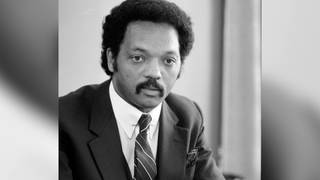
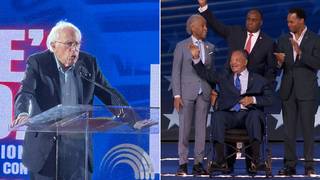
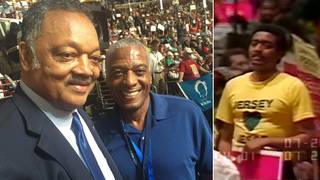






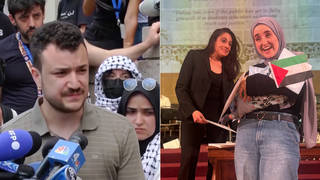

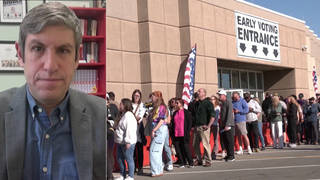
Media Options